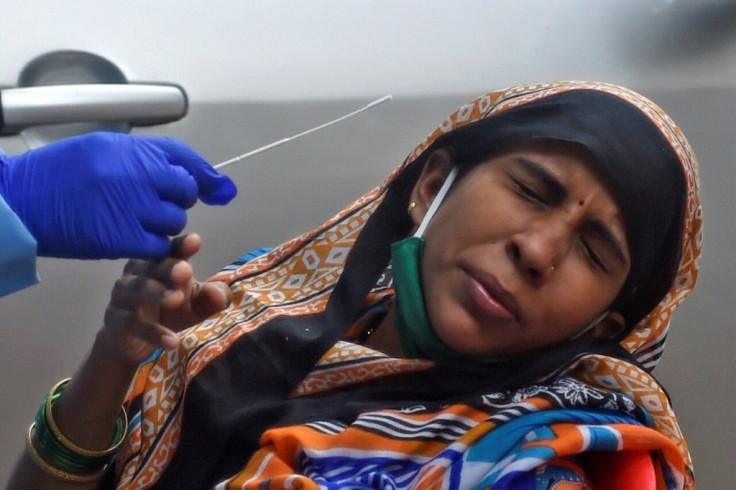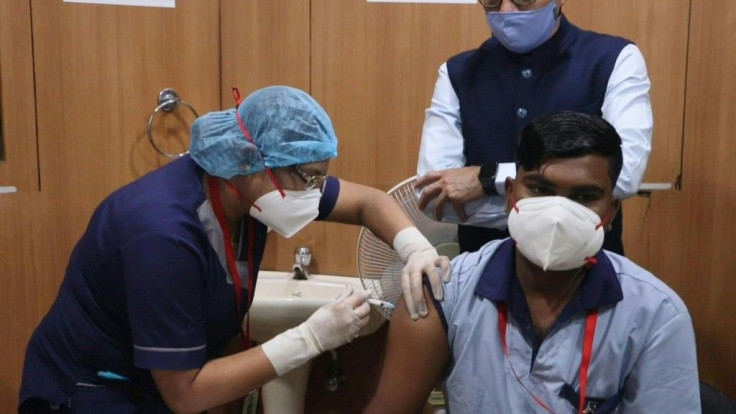India Records Biggest 1-Day Rise In COVID-19 Cases, Authorities Announce Strict Restrictions
KEY POINTS
- India has reported 115,736 new coronavirus infections
- This is the biggest one-day rise in the COVID-19 cases in the country since the pandemic began
- India has the third-most coronavirus cases in the world, after the U.S. and Brazil
India reported 115,736 new coronavirus infections on Wednesday, pushing the country's total cases to 12.8 million.
The last 24 hours saw the biggest one-day rise in COVID-19 cases in India since the pandemic began, as 630 deaths brought the country's death toll to 166,177. India has the third-most coronavirus cases in the world, after the U.S. and Brazil.

Currently, there are 843,473 active cases across the country, while a total of 11,792,135 patients have been discharged, with 59,856 discharges reported in the last 24 hours, according to the Union Health Ministry data.
The Indian Council of Medical Research (ICMR) said that up until April 6, as many as 251,439,598 samples have been tested for COVID-19, out of which 1,208,329 samples were tested on Wednesday.
Late on Tuesday, Vinod K. Paul, a member of the government advisory body NITI Aayog, said the next four weeks would be "very very critical" and urged people to participate in controlling the second wave of coronavirus in the country.
In order to curb the spread of coronavirus, the authorities have announced strict restrictions.
The country's capital, Delhi, on Tuesday, imposed a curfew from 10 p.m. to 5 a.m. until April 30, allowing only essential workers and people traveling to and from vaccination centers on the streets.
"The sudden increase in COVID-19 cases and high positivity rate meant a night curfew was needed," Delhi's regional government said.
With cases continuing to surge, the state of Maharashtra, which is home to India's financial hub Mumbai, has imposed similar restrictions that include night curfews and weekend lockdowns.
On Wednesday, the state reported more than 55,000 new COVID-19 cases which were almost half of the total infections that were reported in the country.
The #Pandemic isn't over and there is no scope for complacency
— Dr Harsh Vardhan (@drharshvardhan) April 7, 2021
On #WorldHealthDay2021 infuse greater zeal to #Unite2FightCorona, get vaccinated on your turn & follow COVID appropriate behaviour scrupulously! @PMOIndia @MoHFW_INDIA #LargestVaccineDrive https://t.co/KSqfJ1xriq
"The pandemic isn’t over and there is no scope for complacency," Health Minister Harsh Vardhan said on Twitter. He also urged people to get vaccinated when their turn comes and follow all the precautions and "COVID-appropriate behavior scrupulously."
Since early February, single-day infections have been rising, after they had dropped to below 9,000.
As per the data compiled by the AFP news agency, the country has recorded more than 549,000 cases in the last seven days.
Cases in Brazil and the U.S. have been decreasing from the previous week, with Brazil recording less than 440,000 and the U.S. more than 453,000 infections.
On Tuesday, India's health ministry said that over 83 million vaccine doses have been administered in order to make sure that by the end of July, 300 million people are immunized.

Meanwhile, Delhi has ordered one-third of all its vaccination sites at government hospitals to open around the clock to speed up the pace of vaccinations.
© Copyright IBTimes 2025. All rights reserved.





















